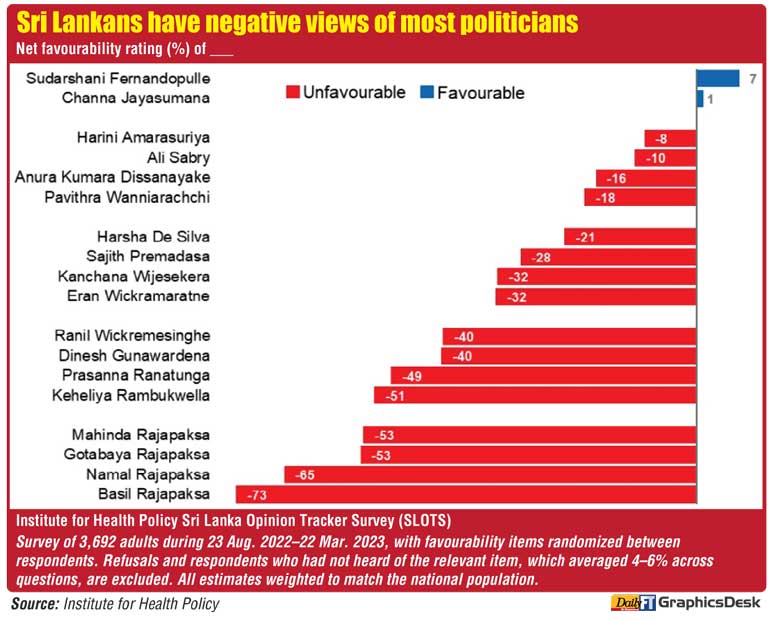Sri Lankans continue to have deeply unfavourable views of most politicians a year after the economic and political collapse in early 2022, and despite progress in recent months in stabilising the economy and in negotiations with the IMF.
In polling during Sept. 2022 to Mar. 2023, almost all politicians tracked by SLOTS had negative favourability ratings, and most had ratings below -30, which make most Sri Lankan politicians as or more unpopular than French President Macron today.
The most popular politician tracked by SLOTS is Dr. Sudarshini Fernandopulle, former State Minister for COVID-19. She had an average net favourability rating of +7, but this was still substantially down from late 2021 when it was typically +50 – +70. The only other politicians who had positive or neutral net favourability ratings, were also professionals and from both the government and opposition: Professor Channa Jayasumuna (+1), Harini Amarasuriya (-8), and Ali Sabry (-10).
The most unpopular politicians tracked were from the Rajapaksa family, all of whom had net favourability ratings less than -50, with Basil Rajapaksa and Namal Rajapaksa being the most unpopular with ratings of -73 and -65.
Other politicians had ratings of -10 to -50, with government politicians generally doing worse than opposition ones, with the exceptions of Pavithra Wanniarachchi (-18) and Kanchana Wijesekera (-32), although both had significantly negative ratings.
Amongst the other party leaders, as previously reported by SLOTS, Anura Dissanayake (NPP/JVP) was less unpopular (-16) than SJB leader Sajith Premadasa (-28), who was more popular than UNP leader President Ranil Wickremasinghe (-40).
IHP Executive Director and lead investigator Dr. Rannan-Eliya said: “These results suggest that the whole political class is discredited. However, it is notable that the politicians with better ratings tended to be professionals or politicians with a reputation of speaking hard truths to the public – Dr. Sudarshini in the case of COVID-19, or Ali Sabry about the economic crisis and the need for painful measures. I think that most politicians don’t want to say difficult things because they think it would make them unpopular, but the public seems to appreciate politicians who try to be honest, even if it means admitting difficult things.”
This analysis uses data collected by the Sri Lanka Opinion Tracker Survey (SLOTS) between 23 August 2022 and 22 March 2023. SLOTS is a national phone survey that has been tracking public opinion every day since August 2021, interviewing people across the country. Respondents are drawn from a mixed sample of a national representative panel of respondents previously recruited in 2019 through face-to-face interviews from all parts of the country, and others reached by randomly dialling mobile numbers.
Respondents are interviewed in their language of choice: Sinhala, Tamil, or English. The specific question about favourability is worded as follows: “Can you tell me whether you have a favourable or unfavourable view of ______ — or that you are unsure or have no view of [it], or that you have not heard of [it].” When interviewers read out the possible responses, the ordering of “favourable” and “unfavourable” is randomised between respondents to minimise bias. The specific individual or institution that respondents are asked their opinion about are randomised between respondents, so no respondent is asked about all items.
Net favourability is the average rating having scored positive responses as +100, negative ones as – 100, and neutral or no opinion responses as zero.
All reported results are weighted to be representative of all Sri Lankan adults by age, gender, ethnicity, religion, household socioeconomic status ranking, education, and province. The household socioeconomic status ranking of respondents is based on a wealth index computed from ownership of household assets, which is calibrated to match the overall national distribution of assets including households without phones.
Weights are trimmed at the 2nd and 99th percentiles to reduce the loss in precision stemming from variance in the weights. The SLOTS survey cannot reach adults living in households without phones, but the weighting adjustment by socioeconomic status and province substantially compensates for this.


